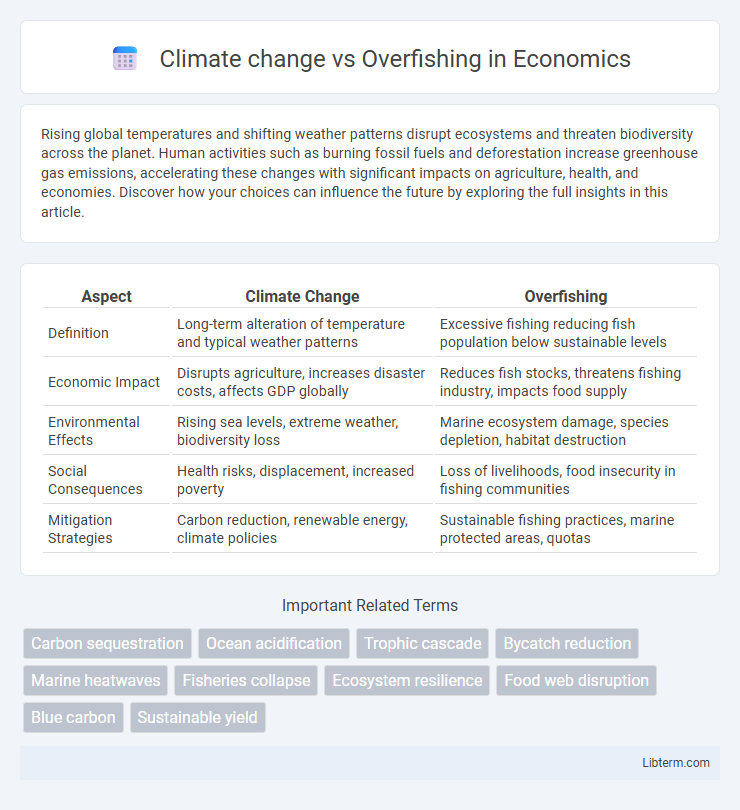Rising global temperatures and shifting weather patterns disrupt ecosystems and threaten biodiversity across the planet. Human activities such as burning fossil fuels and deforestation increase greenhouse gas emissions, accelerating these changes with significant impacts on agriculture, health, and economies. Discover how your choices can influence the future by exploring the full insights in this article.
Table of Comparison
| Aspect | Climate Change | Overfishing |
|---|---|---|
| Definition | Long-term alteration of temperature and typical weather patterns | Excessive fishing reducing fish population below sustainable levels |
| Economic Impact | Disrupts agriculture, increases disaster costs, affects GDP globally | Reduces fish stocks, threatens fishing industry, impacts food supply |
| Environmental Effects | Rising sea levels, extreme weather, biodiversity loss | Marine ecosystem damage, species depletion, habitat destruction |
| Social Consequences | Health risks, displacement, increased poverty | Loss of livelihoods, food insecurity in fishing communities |
| Mitigation Strategies | Carbon reduction, renewable energy, climate policies | Sustainable fishing practices, marine protected areas, quotas |
Understanding Climate Change and Overfishing: Key Differences
Climate change primarily involves the long-term alteration of global weather patterns caused by increased greenhouse gas emissions, significantly affecting ocean temperatures and acidification. Overfishing refers to the excessive harvesting of fish stocks beyond sustainable limits, leading to marine biodiversity loss and disrupted ecosystems. While climate change impacts marine habitats broadly, overfishing directly depletes fish populations, making both issues critical but distinct challenges for ocean conservation.
How Climate Change Impacts Ocean Ecosystems
Climate change alters ocean temperatures, leading to coral bleaching and disrupted marine habitats that diminish biodiversity. Rising CO2 levels cause ocean acidification, which weakens shell-forming species critical to the food web. These changes reduce fish populations and affect the overall health of ocean ecosystems, exacerbating the effects of overfishing.
The Role of Overfishing in Marine Biodiversity Loss
Overfishing significantly exacerbates marine biodiversity loss by depleting key fish populations that maintain ecological balance and disrupt food web dynamics. Targeted removal of top predator species leads to trophic cascades, destabilizing reef ecosystems and coral habitats, thereby reducing overall species richness. Combined with other stressors like climate change-induced ocean warming and acidification, overfishing accelerates the decline of marine biodiversity worldwide.
Interconnections Between Climate Change and Overfishing
Climate change intensifies ocean warming, leading to altered fish migration patterns and reduced breeding grounds, which exacerbate the impacts of overfishing on marine populations. Overfishing diminishes fish stocks, undermining ecosystem resilience and making it harder for marine environments to adapt to climate-induced changes such as ocean acidification and habitat loss. This interconnection between climate change and overfishing creates a feedback loop that threatens biodiversity, fisheries sustainability, and global food security.
Effects on Global Fish Populations
Climate change disrupts global fish populations by altering water temperatures, oxygen levels, and ocean acidification, leading to shifts in fish distribution and reproductive cycles. Overfishing exacerbates these effects by directly reducing fish stocks, causing population declines and threatening species with extinction. The combined pressures of climate change and overfishing compromise marine biodiversity, fisheries sustainability, and global food security.
Economic Consequences for Coastal Communities
Climate change and overfishing both severely disrupt the economic stability of coastal communities by diminishing fish stocks and altering marine ecosystems crucial for local livelihoods. Declines in fish populations driven by warming oceans and unsustainable fishing practices lead to reduced income from fisheries and increased unemployment in these regions. Coastal economies suffer further as tourism and related industries decline due to degraded marine biodiversity and less resilient ecosystems.
Policy Responses to Climate Change and Overfishing
Policy responses to climate change and overfishing center on international agreements and regulatory frameworks that promote sustainable environmental practices. Implementing carbon pricing mechanisms and emissions reduction targets under the Paris Agreement addresses climate change, while regional fisheries management organizations enforce catch limits and gear restrictions to combat overfishing. Integrating ecosystem-based management and enhancing marine protected areas further support the resilience of ocean ecosystems to both climate impacts and overexploitation.
Sustainable Fishing Practices in a Changing Climate
Sustainable fishing practices play a crucial role in mitigating the impacts of climate change on marine ecosystems by promoting resilient fish populations and habitats. Implementing measures such as catch limits, gear restrictions, and protected marine areas helps maintain biodiversity and supports recovery from climate-induced stressors like ocean warming and acidification. Integrating adaptive management strategies ensures fisheries remain productive and ecosystems healthy despite ongoing environmental changes.
Scientific Innovations to Combat Both Challenges
Scientific innovations targeting climate change and overfishing include advanced satellite monitoring systems that track ocean temperatures and fish populations in real time, enabling precise management and conservation efforts. Genetic engineering techniques, such as CRISPR, are being explored to enhance climate resilience in marine species and restore overexploited fish stocks. Renewable energy technologies like offshore wind farms reduce carbon emissions while artificial reefs and autonomous underwater drones support habitat restoration and sustainable fishing practices.
The Future of Oceans: Collaboration for Global Solutions
Climate change and overfishing pose intertwined threats to ocean ecosystems, requiring coordinated global strategies to ensure sustainable marine biodiversity and fisheries. Strengthening international agreements and investing in innovative technologies for ecosystem monitoring enhance the resilience of ocean habitats against temperature rise and resource depletion. Collaborative efforts among governments, scientists, and local communities are crucial to implementing adaptive management practices that safeguard the future of oceans and support food security worldwide.
Climate change Infographic

 libterm.com
libterm.com